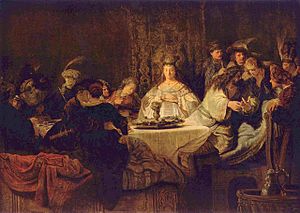“The only two certain things” Franklin may have said, possibly referencing a line by Defoe “are death and taxes”.
However, those who are “in the know” are aware that these things are far from certain, either. The very poor are unaware of taxes, and not really experiencing them, and often not even the benefit of other people paying them. The very rich are also capable of making their tax burdens rather uncertain as to the absolute quantum, and God alone knows what percentage of any particular man or woman’s real efforts have been taken from him in one form of taxation or another and of those which percentage actually used to good effect.
Death also is not certain for the Christian, it is written that some “will not taste of death”, which is generally taken to mean that they will be raptured and changed into their resurrection states in the “twinkling of an eye” (I Cor 15:52). We are also shown in the Bible how Enoch and Elijah are taken bodily to heaven, without dying (Genesis 5:24, 2 Kings 2:11), possibly in order to be the two witnesses we read about in Revelation 11:3-12.
So is anything certain, then? Yes. The certainty is change. The only certainty is that given enough time nothing is certain. Everything must change. And nowhere more is the effect of change seen than when one generation hands over to the next generation. We have another Pharaoh in Exodus who “knew not Joseph” and so the position of the Hebrews in the Egyptian kingdom starts to deteriorate, leading eventually to the Exodus in the parted waters of the Red Sea. But also we see throughout human history how what was decided by one generation in a dynasty is often overturned in the next.
The Nazis wanted to destroy the intellectuals of Poland, and so they executed officers, teachers, theatre directors, librarians, poets, anyone who could lead the people intellectually, along with their families. The children of ordinary farmers and factory workers, they thought, would not be in any state to replace the ones they took. But each time meiosis happens, it is the shuffling and redealing of a much bigger pack of cards than we might think, and genius which was not at all evident in the parents starts to come to the fore in the children. Now Poland is full of clever managers, inventors, thinkers whose parents drove trams or cleaned around in hospitals. I have met such people again and again, and also the opposite, which is a humbling thing, really. We all hope our children will be as clever or cleverer than we are, but this is not always the case either. Some of my readers may even be discovering this at the moment and having to come to terms with it.
A good rule to follow in business succession planning, by the way, is to consider that if you want one of your kids to take over your business from you, you’d better have four, as only 50% of them will have the intelligence needed to do it and only 50% will have the inclination and wish to do it. Both of these are needed and they are not dependent variables. Yes, I know people will turn around and say, “there you go again, GoldList Method Boy, stating things which are not science as if they were when genetics puts all of this differently and goes into detail and contradicts some of what you say”. Well, OK. Nevertheless, this actually works and is a pretty effective way of expressing how you need to prepare if you would like to have a business dynasty.
In the light of all the above, I had a meditation today on one popular story, well known to the kids of the twentieth and twenty-first centuries.
They say that “they all lived happily ever after”, but as far as the seven dwarfs was concerned, the next generation was were it started to go pear-shaped. Grumpy’s kids were all sweetness and light, Sleepy’s kids were workaholics, Sneezy’s kids didn’t have any allergoes to anything and rarely caught colds, Doc’s kids on the other hand were hopelessly unhealthy and also far too thick to be candidates for the medical profession, which was headed by Dopey’s son, the Surgeon general, Happy’s kids were all chronic depressives and Bashful’s lot were never off the television screen unless they were coming sozzled out of nighclubs singing at the tops of their voices with a retinue of fans in tow. This could be the premise for a nice screenplay or telenovella, in which case I am bagging it now and anyone else who does it has to pay me copyright fees? Why? Because my parents were very nice and wouldn’t have asked for copyright fees off annyone.



